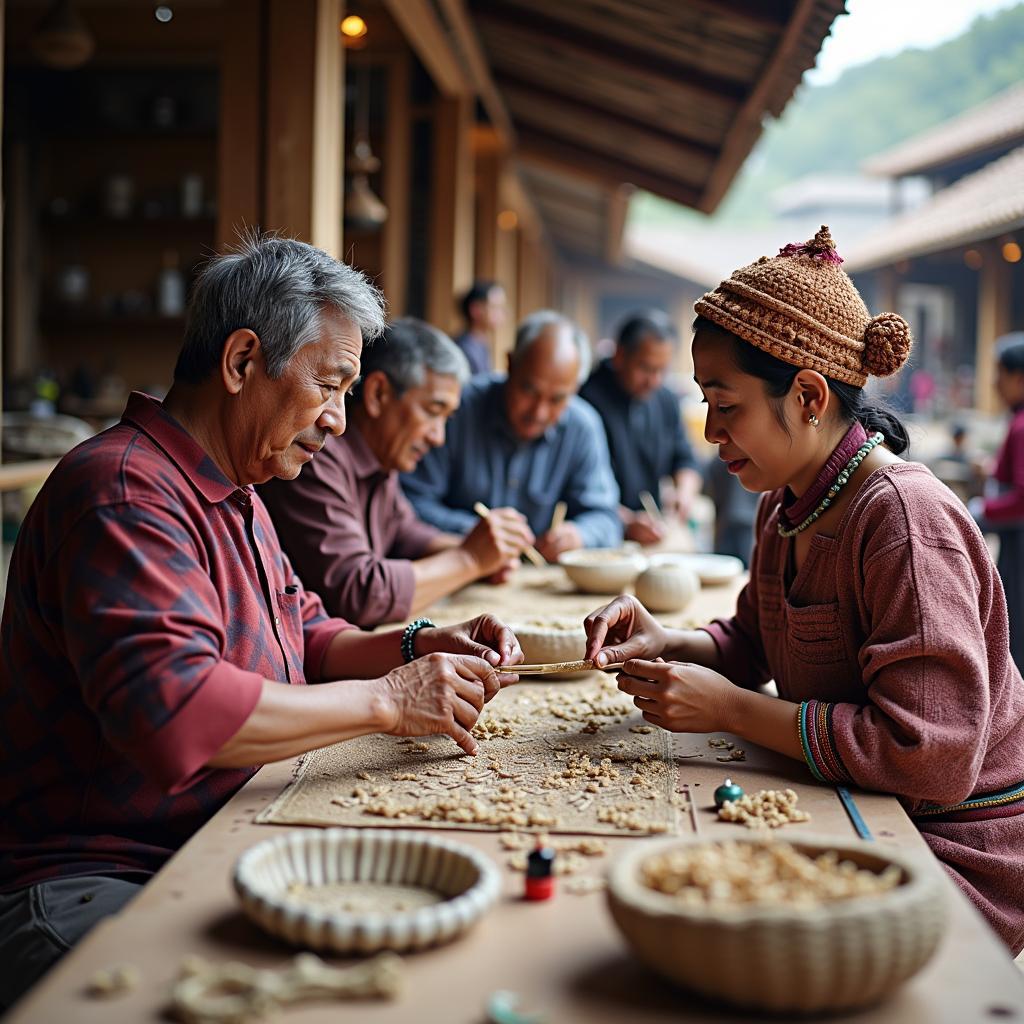Tourism’s impact on local traditions and cultures has been a recurring theme in IELTS Writing Task 2, appearing approximately 2-3 times annually since 2019. Based on this trend and how tourism affects cultural identity in small communities, we can expect similar questions to appear in future tests.
 IELTS candidates writing essays about tourism impact on local traditions
IELTS candidates writing essays about tourism impact on local traditions
Sample Question and Analysis
Some people believe that international tourism has a negative effect on local traditions and cultures. Others think it helps preserve local traditions. Discuss both views and give your own opinion.
Question Analysis
This question requires:
- Discussion of both positive and negative impacts
- Clear personal stance
- Balanced argument structure
- Specific examples to support points
Band 9 Sample Essay
Tourism’s influence on local customs has become a topic of heated debate. While some argue that it undermines traditional practices, I believe that The impact of tourism on local economies can actually help sustain cultural heritage when managed properly.
Those who oppose international tourism often point to the commercialization of local traditions. When sacred ceremonies or ancient customs are performed solely for tourists’ entertainment, they can lose their original meaning and authenticity. For instance, traditional Thai festivals have sometimes been modified to accommodate tourist schedules, potentially diminishing their cultural significance.
However, tourism can play a crucial role in preserving local traditions. The economic benefits from tourism often provide the necessary resources to maintain historical sites and fund cultural programs. In Bali, Indonesia, revenue from tourism has enabled local communities to continue their traditional dance performances and craft-making, passing these skills to younger generations.
 Local artisans demonstrating traditional crafts to tourists
Local artisans demonstrating traditional crafts to tourists
Furthermore, impact of tourism on indigenous cultures can create cultural pride and awareness. When visitors show interest in local customs, it often encourages communities to value and maintain their traditions. For example, in Kyoto, Japan, the geisha culture has been revitalized partly due to international interest.
In my opinion, while the risks of commercialization are real, tourism’s positive effects outweigh its drawbacks when properly managed. The key lies in implementing sustainable tourism practices that respect local customs while providing economic benefits to communities.
Band 9 Score Analysis
- Task Response: 9 (comprehensive coverage, clear position)
- Coherence/Cohesion: 9 (seamless progression, excellent paragraphing)
- Lexical Resource: 9 (sophisticated vocabulary use)
- Grammar: 9 (error-free, complex structures)
Band 6.5 Sample Essay
Many people have different opinions about how international tourism affects local traditions. I will discuss both sides and give my opinion about this topic.
On the negative side, tourism can change local traditions. When many tourists come to a place, local people sometimes change their traditional activities to make money from tourists. For example, in some Asian countries, traditional markets become more like shopping centers for tourists.
However, tourism can also help keep traditions alive. Tourist money helps local people continue their traditional jobs like making handicrafts or performing traditional dances. This means young people can learn these skills from older generations.
how global trade influences cultural exchange shows that tourists also help local people feel proud of their culture. When tourists want to learn about local traditions, local people want to keep these traditions.
I think tourism has more good effects than bad effects on local traditions. But local governments should make rules to protect traditions from too much change.
Band 6.5 Score Analysis
- Task Response: 6 (adequate coverage, simple development)
- Coherence/Cohesion: 7 (clear progression)
- Lexical Resource: 6 (adequate but repetitive)
- Grammar: 7 (mix of simple and complex structures)
Key Vocabulary
- commercialization (n) /kəˌmɜːʃəlaɪˈzeɪʃən/ – the process of making something available for sale
- authenticity (n) /ɔːθenˈtɪsəti/ – the quality of being genuine
- indigenous (adj) /ɪnˈdɪdʒənəs/ – naturally existing in a place
- revitalize (v) /ˌriːˈvaɪtəlaɪz/ – to give new life or vigor to
- sustainable (adj) /səˈsteɪnəbl/ – able to continue over time
Practice Suggestions
For further practice, try writing essays on these related topics:
- The role of technology in preserving cultural traditions
- Mass tourism’s impact on historical sites
- Cultural exchange between tourists and local communities
Share your practice essays in the comments section for feedback and discussion.


